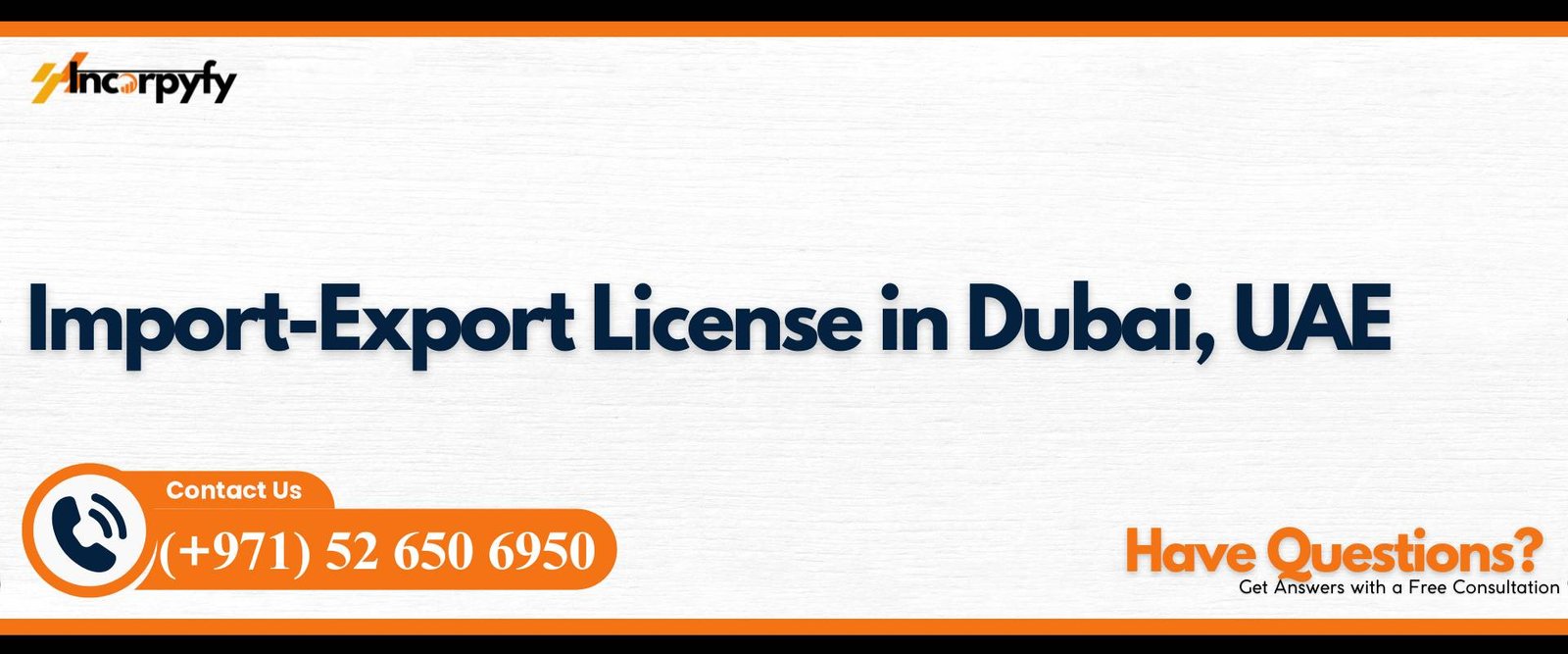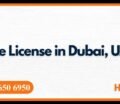
Dubai is one of the world’s leading trading hubs, strategically located between Asia, Europe, and Africa. Every year, thousands of businesses establish trading companies in Dubai to benefit from its logistics network, tax advantages, and free trade policies. To participate in cross-border trade legally, entrepreneurs must obtain an import-export license in Dubai, UAE.
This license is issued by the Dubai Department of Economy and Tourism (DET) for mainland businesses or by the respective free zone authorities for companies registered in free zones. Whether you want to import raw materials, export manufactured products, or set up a global trading company, an import-export license ensures compliance and smooth operations.
What is an Import-Export License in Dubai?
An import-export license in Dubai is an official business license that authorizes companies to trade goods and services across international borders. It allows businesses to import products into the UAE and export them to other countries while benefiting from Dubai’s trade infrastructure.
Purpose of the License
- Regulates trading activities to prevent illegal practices.
- Ensures companies are registered with Dubai Customs.
- Enables businesses to issue and receive trade invoices.
- Provides access to corporate bank accounts and international transactions.
Importance of Import-Export License in Dubai
An import-export license in Dubai is essential for companies involved in global trade. It ensures legal compliance, provides access to customs clearance, and enables smooth business operations. With Dubai’s position as a leading logistics hub, the license helps entrepreneurs expand into regional and international markets with credibility and ease.
Strategic Trade Hub
Dubai is home to world-class ports like Jebel Ali Port and airports such as Dubai International Airport, making it an ideal gateway for global trade.
Tax and Customs Benefits
Companies with an import-export license enjoy customs duty exemptions, free zone incentives, and low tax structures.
Global Market Access
The license allows businesses to access not just the UAE market but also GCC countries, MENA, and international trade partners.
Investor-Friendly Policies
The UAE government offers 100% foreign ownership in many trading activities and simplified business setup processes.
Legal Framework for Import-Export License in Dubai
The import-export license is regulated by the Dubai Department of Economy and Tourism (DET) for mainland companies and free zone authorities for zone-based businesses. Every trading company must also register with Dubai Customs to obtain a Customs Code, ensuring compliance with UAE’s trade regulations and international shipping standards.
Mainland Regulation
For mainland companies, the Dubai Department of Economy and Tourism (DET) oversees the issuance of import-export licenses. Businesses must also register with Dubai Customs to obtain an Import-Export Code (IEC).
Free Zone Regulation
Companies established in free zones operate under the respective free zone authority (such as JAFZA, DMCC, or DAFZA). They enjoy special incentives like tax exemptions, duty-free operations, and 100% foreign ownership.
Customs Code Requirement
Every import-export company must obtain a Customs Code from Dubai Customs. Without this, goods cannot be cleared at ports or airports.
Types of Import-Export Licenses in Dubai
Businesses can apply for different import-export licenses depending on their activity. These include general trading licenses, commercial licenses for specific goods, e-commerce licenses, and specialized permits for sectors such as food, medicine, or chemicals. Each type requires separate approvals, ensuring that companies operate legally within Dubai’s regulatory framework.
Trading License
A general license that covers import, export, and re-export of goods.
Commercial License
Allows businesses to trade in specific categories of goods such as food, electronics, textiles, and more.
E-Commerce License
Authorizes online trading and shipment of products purchased through digital platforms.
Specialized Licenses
Certain industries like pharmaceuticals, chemicals, and food require additional approvals from regulatory authorities such as the Dubai Municipality, Ministry of Health, or Food Safety Department.
Steps to Get an Import-Export License in Dubai
The process to get an import-export license in Dubai includes selecting a business activity, choosing between mainland or free zone, reserving a trade name, securing initial approval, leasing an office or warehouse, submitting documents, and paying fees. Finally, businesses must register with Dubai Customs to obtain a Customs Code.
Step 1: Choose Business Activity
Select the category of goods you want to import or export. Some products require special approvals (e.g., medical, chemical).
Step 2: Select Jurisdiction
Decide between mainland or free zone. Mainland gives direct access to UAE markets, while free zones offer tax incentives and 100% ownership.
Step 3: Reserve Trade Name
Choose a business name that complies with UAE regulations and submit it for approval.
Step 4: Apply for Initial Approval
Submit the application to DET (mainland) or the free zone authority to receive preliminary approval.
Step 5: Lease Office or Warehouse
A lease agreement or Ejari is required for mainland businesses. Free zones provide flexi-desk, office, or warehouse packages.
Step 6: Prepare Documents and Submit Application
- Passport copies of shareholders and directors
- Emirates ID (if resident)
- MoA/AoA (Memorandum/Articles of Association)
- Lease agreement
Step 7: Obtain Import-Export License
Once documents are approved and fees are paid, the license is issued by the respective authority.
Step 8: Register with Dubai Customs
Apply for a Customs Code to clear goods through ports and airports.
Documents Required for Import-Export License in Dubai
Key documents for an import-export license include passport copies of shareholders, Emirates ID (for residents), Memorandum of Association (MoA), trade name reservation, and Ejari lease contract. Free zone companies also require incorporation documents. These ensure businesses meet UAE’s legal requirements and can complete customs registration without unnecessary delays.
For Individual Shareholders
- Passport copy
- Visa and Emirates ID (for residents)
- Passport-size photographs
For Corporate Shareholders
- Certificate of incorporation
- Memorandum of Association (MoA)
- Board resolution approving investment
Additional Documents
- Trade name reservation certificate
- Ejari or office lease contract
- Initial approval certificate
Cost of Import-Export License in Dubai
The cost of import-export license in Dubai varies depending on location (mainland or free zone), activity, and office requirements.
Mainland Costs
- Trade name reservation: AED 600 – 1,000
- Initial approval: AED 1,000 – 1,200
- MoA notarization: AED 2,000 – 3,000
- Office lease (Ejari): AED 10,000 – 20,000 annually
- Import-export license issuance: AED 10,000 – 15,000
- Customs registration: AED 1,000 – 1,500
- Total estimated cost: AED 25,000 – 35,000
Free Zone Costs
- License package: AED 12,500 – 20,000
- Office/desk facilities: included in most packages
- Visa allocation: AED 3,000 – 5,000 per visa
- Customs registration: AED 500 – 1,500
- Total estimated cost: AED 15,000 – 30,000
Customs Registration and Import-Export Code (IEC)
The Import-Export Code (IEC), also called Customs Code, is mandatory for all businesses engaged in import/export activities.
Why It’s Required
- Needed to clear goods at ports and airports.
- Used for customs declarations.
- Required for opening a trade account with logistics companies.
Process to Obtain IEC
- Apply online at Dubai Customs portal.
- Submit trade license copy, MoA, and office lease.
- Pay registration fee.
- Receive Customs Code within a few working days.
Benefits of Import-Export License in Dubai
Holding an import-export license in Dubai enables access to global markets, tax benefits, and customs duty exemptions. Investors also enjoy 100% foreign ownership in free zones, multiple visa eligibility, and strong logistics infrastructure. This license creates growth opportunities for companies aiming to expand into the GCC and beyond.
Access to Global Markets
The license enables businesses to connect with international suppliers and buyers across continents.
Tax Advantages
Companies in free zones enjoy 0% corporate tax, customs duty exemptions, and no personal income tax.
Strong Logistics Infrastructure
Dubai has state-of-the-art ports, airports, and free zones, ensuring efficient supply chain management.
100% Foreign Ownership
Many business activities allow full foreign ownership, especially in free zones.
Multiple Visa Allocation
License holders can apply for multiple visas depending on office or warehouse space.
Free Zones Offering Import-Export Licenses in Dubai
Dubai has world-class free zones offering import-export licenses, including JAFZA, DMCC, DAFZA, and Dubai South. These zones provide 100% ownership, tax holidays, and simplified customs processes. Each free zone specializes in industries like commodities, aviation, or shipping, giving businesses flexibility and strategic advantages for global trading operations.
Jebel Ali Free Zone (JAFZA)
One of the largest free zones in the world, ideal for logistics and shipping companies.
Dubai Multi Commodities Centre (DMCC)
Specializes in commodities trading such as gold, diamonds, tea, and coffee.
Dubai Airport Free Zone (DAFZA)
Best for companies relying on air freight and time-sensitive goods.
Dubai South Free Zone
Strategically located near Al Maktoum International Airport, focused on aviation and logistics.
Renewal of Import-Export License in Dubai
The license is valid for one year and must be renewed annually.
Renewal Process
- Submit updated Ejari or lease agreement
- Pay renewal fees
- Renew trade name and other permits if required
Renewal Costs
- Mainland renewal fees: AED 8,000 – 15,000
- Free zone renewal fees: AED 10,000 – 20,000
Challenges in Obtaining Import-Export License
While obtaining an import-export license in Dubai is simple, challenges include strict banking compliance, customs approvals for restricted goods, and warehouse leasing requirements. Delays may occur if documentation is incomplete or translations are missing. Working with experienced consultants helps businesses navigate these challenges and complete the setup smoothly.
Customs Approvals
Certain goods require approvals from Dubai Municipality or Ministry of Health.
Banking Compliance
Opening a corporate bank account may involve strict compliance checks.
Warehouse and Logistics
Finding suitable warehouse space in mainland Dubai can be costly.
Documentation
All documents must be in order, and delays can occur due to missing paperwork.
VAT Registration for Import-Export Businesses
Import-export businesses in Dubai must comply with VAT regulations. VAT is applied at 5% for companies exceeding an annual turnover of AED 375,000. Businesses must maintain proper accounts, file quarterly VAT returns, and ensure invoices are compliant. Voluntary VAT registration is also available for smaller businesses above AED 187,500.
VAT in UAE
The UAE introduced Value Added Tax (VAT) at 5% in 2018.
Requirement for Import-Export Companies
- Mandatory if annual turnover exceeds AED 375,000.
- Voluntary registration for turnover above AED 187,500.
Compliance
Businesses must:
- File quarterly VAT returns.
- Maintain proper accounting records.
- Charge VAT on taxable supplies.
Conclusion
Obtaining an import-export license in Dubai, UAE is one of the best steps for entrepreneurs aiming to establish themselves in global trade. With tax benefits, strong logistics infrastructure, and access to GCC and international markets, Dubai is the perfect destination for trading businesses. By understanding the process, costs, and compliance requirements, investors can set up efficiently and enjoy long-term success.
For smooth setup and professional guidance, many investors choose to work with experienced business setup consultants in Dubai who simplify the process and ensure compliance.
FAQs
How do I get an import-export license in Dubai?
Apply through DET (mainland) or free zone authority, reserve a trade name, lease office space, prepare documents, and register with Dubai Customs for a Customs Code.
How much does an import-export license cost in Dubai?
Costs range from AED 15,000 to 35,000, depending on mainland or free zone setup, visa allocations, and office requirements.
What is a Customs Code in Dubai?
A Customs Code (Import-Export Code) is issued by Dubai Customs and is mandatory to clear goods through ports and airports.
Can foreigners own import-export companies in Dubai?
Yes. Many activities now allow 100% foreign ownership, especially in free zones.
Do import-export businesses in Dubai need VAT registration?
Yes. If the company’s turnover exceeds AED 375,000 annually, VAT registration is mandatory.






